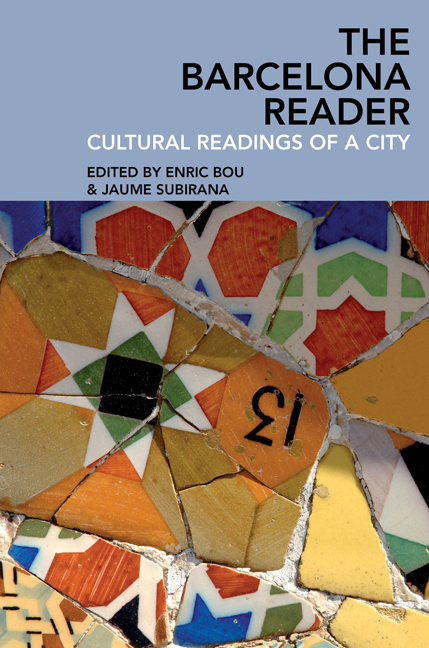Book contents
- Frontmatter
- Contents
- List of illustrations
- Notes on contributors
- Introduction: Barcelona: Cultural readings of a city
- I City, history, and territory
- II City and society
- 6 Barcelona and modernity
- 7 Football and identities in Catalonia
- 8 The family and the city: Power and the creation of cultural imagery
- 9 Memory and the city in Barcelona's cemeteries
- III Art, architecture, and the city
- IV The Olympics and the city
- V Literature, cinema, and the city
6 - Barcelona and modernity
from II - City and society
- Frontmatter
- Contents
- List of illustrations
- Notes on contributors
- Introduction: Barcelona: Cultural readings of a city
- I City, history, and territory
- II City and society
- 6 Barcelona and modernity
- 7 Football and identities in Catalonia
- 8 The family and the city: Power and the creation of cultural imagery
- 9 Memory and the city in Barcelona's cemeteries
- III Art, architecture, and the city
- IV The Olympics and the city
- V Literature, cinema, and the city
Summary
For Joana Crespi, who taught me Catalan, introduced me to the streets of Barcelona, and invited me to my first dry Martini at Can Boadas; in memoriam
Great Enchantress; Rose of Fire; Manchester of Spain; Paris of the South; City of Bombs; City of Marvels; City of Architects; Olympic Village; design capital; gastronomic centre; soccer powerhouse; tourist mecca; cultural forum; international hot spot: modern Barcelona has been, and continues to be, many things to many people. For Rubén Darío, it was a place of cosmopolitan refinement, home to the only modernist ‘brotherhood’ in all of Spain (254). For Jean Genet, it was a place of exquisitely abject desire populated by beggars, thieves, queers, and whores (18). For designer Javier Mariscal, it is a place of bars and sky and waves, as his famous poster from 1979 attests: Bar cel ona. If Darío yearned for a select fraternity of sophisticated artists, and Genet for a sordid congregation of divine outlaws, Mariscal, who later created the happy Olympic mascot Cobi, has had his ear pressed to the profitable pulse of the culture industry. Broken down and built back up, Bar cel ona can be marketed and consumed – happily, giddily, drunkenly – as a place of perfect postmodern pomp where more culturally motivated visitors can sip a beer in the Quatre Gats (a beer house–café made famous by Picasso) and buy trinkets that commemorate the effective desacralization of the Sagrada Família (Antoni Gaudí's great unfinished expiatory temple) and where more raucously motivated visitors can fry themselves on newly sanded beaches and vomit their cold northern repression onto steamy summer streets.
The capital of Catalonia, a nation (malgré the Partido Popular) without a state (malgré Esquerra Republicana), Barcelona is a metropolis in which sangria, Mexican sombreros and tapas, Dior, Gucci and Armani, Starbucks and McDonalds, Deutsche Bank and ING, coexist – such a gentle, deceptive word – alongside such international successes as Miró, Gaudí, and Tàpies and such national specialities, some of them quaintly seasonal, as panellets and pa amb tomàquet, calçots and caganers, sardines and sardanas. In its vacillations between the material and symbolic manifestations of global capital and local pride, Barcelona is far from unique; and yet, as with so many other places, its movers and shakers strive to present it as unique, as marvellous and enchanting, as far removed from the industrial grime and class turmoil of times gone by.
- Type
- Chapter
- Information
- The Barcelona ReaderCultural Readings of a City, pp. 145 - 162Publisher: Liverpool University PressPrint publication year: 2017



